Supreme Court: A Division Bench of Sanjay Kishan Kaul and M.M. Sundresh, JJ. dismissed a writ petition filed by an advocate seeking to stall elevation of a judicial officer as a Judge of the Telangana High Court. The Supreme Court said that the petition was a gross abuse of the process of law and imposed costs of Rs 5 lakh on the petitioner.
The petitioner, B. Sailesh Saxena, is an advocate enrolled with the Bar Council of Telangana since the year 2000. He filed the instant petition seeking a writ of mandamus or an appropriate writ, order or direction directing the Union of India, State of Telangana and Registrar (Vigilance & Administration) of the Telangana High Court to consider his representation and take necessary action as per law. In effect, the petitioner stated that the recommendation of Venkateswara Reddy, Registrar General of the Telangana High Court should not be processed for elevation as a Judge of the High Court. The petitioner made various allegations against the Registrar General and other persons.
Proceedings before the High Court
The Supreme Court took notice of the writ petition filed by the petitioner before the Hyderabad High Court which was decided vide B. Sailesh Saxena v. Union of India, 2018 SCC OnLine Hyd 267. The Supreme Court discussed the ramifications of that judgment.
In that petition, the petitioner claimed that he was a legal advisor for the family of a Member of Parliament and legal counsel for other politically connected persons. He claimed to have suffered on account of political prejudices as the petitioner and his family members were being subjected to torture due to harassment by police authorities. The High Court had noted that there are various criminal complaints pending investigation against the petitioner himself. One such complaint was lodged by the Registrar General (whose elevation as a Judge the petitioner was now trying to stall) in his capacity as the then Registrar (Judicial), pursuant to a direction issued by the High Court. The allegation was that the petitioner had filed writ petitions on behalf of fictitious non-existent persons.
The case of the petitioner before the High Court was that multiple FIRs were being filed with a view to harass the petitioner, and the complaint registered at the instance of the Registrar pursuant to the direction of the Court would also fall in the same category. The High Court was of the opinion that the Registrar as a responsible officer only followed the direction passed by the High Court and, thus, what the petitioner attempted to do was to derail the course of investigation in the complaints lodged against him.
The instant writ petition
The Supreme Court said that it was surprised at the brazenness of the petitioner now filing a petition under Article 32 of the Constitution. It was observed:
“We are surprised as the brazenness of the petitioner now filing the present petition under Article 32 of the Constitution of India, the aforesaid being the finding against him, to now somehow see that the elevation of [the Registrar General] does not take place on the account of these proceedings initiated by the petitioner. This is gross abuse of process of law.”
Observing that there exist sufficient safeguards in the system for appointment of Judges to the High Court, the Supreme Court explained:
“The process of appointment of judges to the High Court is under a well known established process where the collegium of the High Court considers recommending the names and in case of judicial officers by seniority and on merits. Thereafter, the proposed IB inputs and other inputs are obtained and the Government processes the names. The collegium of the Supreme Court has the benefit of all the material before taking a call on whether to recommend the name or not. The appointment takes place thereafter by issuance of warrants of appointment. “
Conclusion
The Supreme Court considered the endeavour of the petitioner as one of harassing the Registrar General of the Telangana High Court and abusing the court proceedings. The Court was of the view that since nothing else seem to deter the petitioner in such endeavours, imposition of costs seems to be the only solution.
The Court dismissed the writ petition with costs of Rs 5 lakh to be deposited by the petitioner with the Supreme Court Advocates On Record Welfare Fund. Additionally, the Bar Council of Telangana was directed to examine the petitioner’s conduct as a member of the “noble profession”. [B. Sailesh Saxena v. Union of India, WP (Civil) No. 555 of 2020, decided on 3-9-2021]
Advocates before the Court:
For Petitioner(s):
V. Chidambresh, Sr. Adv.
Aakash Sirohi, AOR







